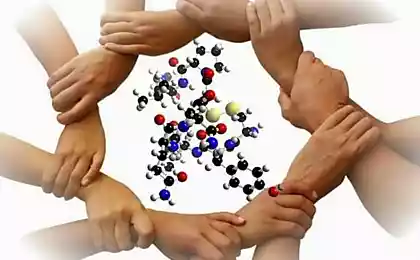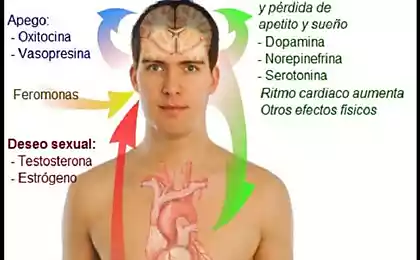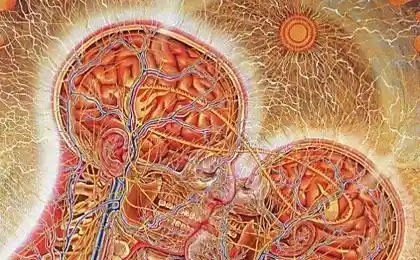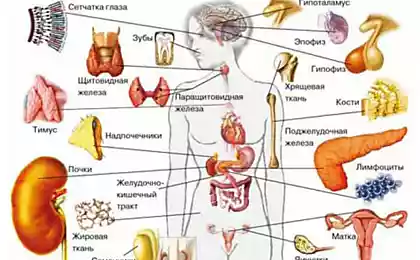886
The hormone oxytocin: the dark side of the force
In a previous article, I examine the positive side of the action of oxytocin. But well everything in moderation. Excess oxytocin also has many negative manifestations. Today let's talk about the dark side of oxytocin. Despite the fact that oxytocin has received such titles as "the love hormone" and "hormone of happiness", on assurances of scientists, it has a "dark side".
Signs of excess oxytocin can occur in many lactating women, couples, trapped in a cult and also some men with reduced testosterone.
In addition, some mentally ill people the levels of oxytocin can be above the rules 10 times. In addition, you may notice that many of the "dark" peculiarities of oxytocin actively used propaganda, as we know, to unite (increasing oxytocin) name is only against someone (aggression).
So when I want without the rest will dissolve in other people (family, friends, sect, etc.), be careful and keep boundaries. Yes, the merger is often pleasant, but its overdose occur serznye side effects!

1. The decreased cognitive abilities.
Some of the functions of learning and memory may be impaired after application of oxytocin. Systemic administration of oxytocin affects the recovery of information during test remembering. Curiously, oxytocin is considered to be a tool that can facilitate the memorization process social information (who is who, who have, birthdays, who he loves, and all other information is remembered worse).
Physiologists have even called the amnesic oxytocin hormone, "the hormone of forgetting." Oxytocin inhibits the ability to remember and retrieve from memory a previous experience. Biologically need it in order to force the brain to work selectively in favor of the child and be "here and now". Mother literally cannot concentrate on anything else.
In addition, there is a General effect of inhibition of mental activity and reduced motivation. Of course, oxytocin reduces anxiety levels, but at the same time it weakens the motivation, because motivation requires some level of anxiety. Oxytocin inhibition of memory along with other risks of the decree leads to the inability of the mother to "go beyond" the current situation and to understand, for example, that the cry of a child can not last forever.
This produces so-called "tunnel perception": the obsession that woman think she is in a state of despair, and the strength to change something there (remember the lack of motivation!). However, the mother should begin to rearrange life to suit its own interests.
2. Aggression to the "other".
Oxytocin increases trust only "their own". Scientists have found that oxytocin strengthens interpersonal ties within groups, but provokes rivalry and antagonism between groups (including ethnic conflicts). Oxytocin causes more favorable location to other people, allows you to believe the words of a particular person, but only in certain cases: it applies only to intra-group relations. Oxytocin also stimulates the reduction of trust to strangers and strengthen cultural and racial prejudice.
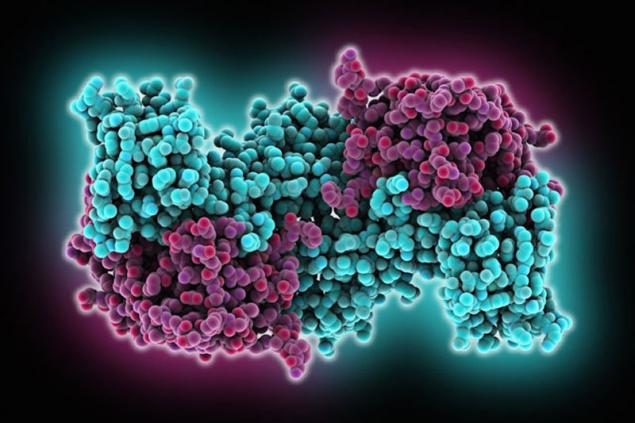
Oxytocin increases the desire to protect their own and to encourage the application of "pre-emptive strikes" to outsiders for the purpose of protection against possible aggression from them. Suggest that altruism in humans was initially aimed only at the members of his group and developed in a single complex with hostility to outsiders.
Such altruism is called "parochialism", that is parochial, narrow, focused only on their. Parochially altruism and today remains a very distinctive feature of the human psyche and behavior.
Many people are willing to sacrifice your own interests (i.e. to commit an altruistic act) for the sake of their. However, they are often no less willing to sacrifice, and in order to cause harm to the representatives of hostile groups. The military exploits and the actions of terrorists-suicides are typical examples of this behavior. In human societies, altruistic actions of both types as a rule, highly valued, considered to be "moral", "heroic", "Patriotic", etc.
As for health, many pseudo-HLS flow often have maternity or nursing mothers: it is raw foodists, parasites, cleaning and more. Contributed to this development one little thing in the psychological portrait: a hostile attitude to strangers. The division of the world into "us" and "them." The confidence that someone (the manufacturers of infant formula, scientists, doctors...) wants to deliberately cause you harm.
It turned out that oxytocin increases the frequency of "acts of aggression" against the opponents (that is, refusal to cooperate, which is always prejudicial to the interests of the opponents), but not always, and only if such conduct were motivated by "fear", that is, the desire to protect the group. The oxytocin stimulated the hostility to outsiders under the influence of "greed", but stimulated her under the influence of "fear."
The study showed that parochially altruism is indeed under the control of the oxytocin system. Oxytocin improves their attitude and their willingness to support and protect, but does not change attitude to outsiders. Oxytocin may even stimulate aggression, but only if it has the character of a "preemptive strike" and aimed at protecting their group from possible hostile actions from the rivals.
Oxytocin, however, does not cause people desire to hurt others "just because", without any benefit to themselves, and does not stimulate aggressive acts based on selfish motives. In other words, oxytocin may provoke a "defensive" but not "offensive" aggression (unlike testosterone).
These studies show that oxytocin is associated with the dynamics of the group. Oxytocin also affects the response of a member of a certain group to a member of another group. Intra-group favoritism is manifested in small groups; but it can also spread to a large group (for example, a country that leads to civil Union).
A study conducted in the Netherlands shows that oxytocin increases within group favoritism of their nation, and at the same time reduces the acceptance of representatives of other ethnic groups and foreigners. People under the influence of oxytocin have also demonstrated attachment to the national flag, while remaining indifferent to other cultural objects.
It is assumed that this hormone also may be due to xenophobia. Thus, oxytocin affects people on an international level, when the home country becomes an in-group, and all the rest of the country – they group. As you can see from the media, there is a simple method of manipulation: you need to create the identity of "their", then bully you "fear" and you're ready to hit the first, thinking that "protection".

3. Amplifies negative emotions.
Oxytocin, after intranasal administration of oxytocin increases envy and Schadenfreude. Especially clearly manifested malevolence to the "alien" is a relish of the grief of others, which becomes more important than their problems.
If you hurt someone, and I, with you, condemn the offender and cursing at him, the illusion that I show to you care. Taking your side and criticizing your opponent, I'm stimulating the production of oxytocin in your and your body. So people (often with a testosterone deficiency and dopamine) tend to cluster in groups and to exclude someone from your circle, discussing something, and thus stimulating the production of oxytocin.
4. Restorative behavior.
As they say, "drunk on your arms". Analysis of published works on the topic of the effects of alcohol and oxytocin on behavior allowed us to make several unexpected insights. Surprisingly, oxytocin and alcohol act on different receptors in the brain, but the result of their action is very similar.
It is possible that alcohol and oxytocin act on the most important inhibitory neurotransmitter GABA, which influences our sensitivity to stress, anxiety level. Moreover, especially in situations that cause excitement, such as when you interview for a job.
However, according to the authors, oxytocin, in the same way as alcohol, can not only reduce the feeling of fear and anxiety, but also to provoke the man into doing something rash, can cause aggressive, antisocial, risky behavior. A high level of oxytocin makes females fearless in many mammals.
5. Causes excessive credulity.
Two independent studies have shown that oxytocin can also lead to harmful consequences, because the trust can become excessive. A normal person in the "game of trust" is becoming less generous (gullible) after his confidence was once deceived by a partner. But in men, which dripped into the nose oxytocin, this is not happening: they continue to blindly trust the partner, even after the partner of their "betrayal".
If a person is to report bad news, when he looks at someone's face, then that person will subsequently him seem less attractive. This does not happen in men, which dripped into the nose oxytocin. Begins to clear and the neurological mechanism of action of oxytocin: it turned out that it inhibits the activity of the amygdala. Apparently, this leads to a decrease in alertness (people are no longer afraid that they cheated).
6. Increases suggestibility.
Scientists have figured out how to make any person more susceptible to hypnosis. All you need is a release of oxytocin, says New Scientist. Richard Bryant of the University of New South Wales in Sydney. We studied the introduction of oxytocin increased hypnotibility low to medium.
Most likely, oxytocin increases the level of trust in the hypnotist. This can increase the effectiveness of hypnosis for medical purposes. In particular, some research works have proved that hypnotic effect allows a reduction in the severity of pain after surgery and speed up recovery.
Earlier, Bryant and his colleagues have demonstrated that after inhalation of aerosolized oxytocin volunteers are not only easier to fall under the influence of the hypnotist, but also more likely to agree to actions that may cause psychological embarrassment: brane swearing, dancing, etc.
In the new study, psychologists have studied the ability of self-hypnosis. The volunteers were asked to try to hypnotize themselves with the help of audio recordings. The greatest success in this occupation have achieved experimental to "cut" the genes of receptors for oxytocin in parts of chromosomes rs53576 and rs2254298.
7. Increases the hostility.
If a person has mental problems, the oxytocin only exacerbates their symptoms. For example, in studies, players with borderline personality disorder often left the game early after they were given a spray with oxytocin. That is, the hormone increased the already high level of hostility and suspicion against the partner. But mentally healthy people showed more accommodating after a dose of oxytocin.
In addition, studies on humans showed that a single dose of oxytocin in specific contexts may make them more aggressive towards outsiders and rivals. And patients with the psychiatric disorder known as borderline personality disorder, oxytocin inhibits the development of trust and cooperation.
8. Increases the number of lies.
Installed in a controlled trial that studies the biological cause of immoral behavior that oxytocin contributes to the manifestation of dishonesty. People with a high level of oxytocin is easier to lie for the sake of the interests of the group. A team of scientists found that increased levels of oxytocin in the blood helps to ensure that people can easily lie in the interests of the group, the degree of their integrity remains intact, if we are talking about personal interests. The results are published in the journal PNAS. Having studied the results of experiments, scientists have concluded that elevated level of oxytocin increases the likelihood that people will lie if the lie would benefit the group, but for myself, I prefer to remain honest. Moreover, those who received a dose of oxytocin, quickly answered the question that is pondered your response a little time.
9. Increase anxiety (negative social memory).
Scientists discovered that oxytocin strengthens negative social memory and anxiety for the future, giving rise called ERK signaling pathway, is activated for 6 hours after a negative social events. ERK enhances fears, stimulating the brain the chains of fear. In other words, not only love, but the anxiety generated by neuroprogenitor called oxytocin. Genetically modified rats (have an excess of oxytocin receptors) show a stronger fear response to stress. Oxytocin enhances the aversive social memory, allowing the rats to exhibit more vivid reaction, expressed the fear when the aversive stimulus occurs again. That is the most people with high oxytocin to scare some "fear", the more they fear it.
10. Inhibits the production of testosterone.
Testosterone is an important hormone in men and women. Testosterone stimulates "individual", "competitive" behavior, in contrast to the "community" of oxytocin. Additionally, testosterone makes a person more honest, more rational, more sexy (applies to both men and women). Oxytocin is responsible for reciprocal behavior, while testosterone, by contrast, encourages men (especially men) to selfish behavior. In the final part we will discuss the balance of oxytocin and testosterone, since they mutually inhibit each other.
Michael Grothaus: As a rejection of sugar changed my lifethe Hormone oxytocin: the light side of the force a Typical picture of the "obdubashennye" oxytocin with low testosterone: low cognitive ability, passion inseparably to belong to a certain group, "his" hatred of "others" aggression, negative emotions, malice, and envy, disinhibited behavior, over-confidence, heightened suggestibility, hostility, deceit, anxiety, low libido and competitiveness.published
Author: Andrey Blueskin
Source: www.beloveshkin.com/2017/01/oksitocin-temnaya-storona-sily.html
Signs of excess oxytocin can occur in many lactating women, couples, trapped in a cult and also some men with reduced testosterone.
In addition, some mentally ill people the levels of oxytocin can be above the rules 10 times. In addition, you may notice that many of the "dark" peculiarities of oxytocin actively used propaganda, as we know, to unite (increasing oxytocin) name is only against someone (aggression).
So when I want without the rest will dissolve in other people (family, friends, sect, etc.), be careful and keep boundaries. Yes, the merger is often pleasant, but its overdose occur serznye side effects!

1. The decreased cognitive abilities.
Some of the functions of learning and memory may be impaired after application of oxytocin. Systemic administration of oxytocin affects the recovery of information during test remembering. Curiously, oxytocin is considered to be a tool that can facilitate the memorization process social information (who is who, who have, birthdays, who he loves, and all other information is remembered worse).
Physiologists have even called the amnesic oxytocin hormone, "the hormone of forgetting." Oxytocin inhibits the ability to remember and retrieve from memory a previous experience. Biologically need it in order to force the brain to work selectively in favor of the child and be "here and now". Mother literally cannot concentrate on anything else.
In addition, there is a General effect of inhibition of mental activity and reduced motivation. Of course, oxytocin reduces anxiety levels, but at the same time it weakens the motivation, because motivation requires some level of anxiety. Oxytocin inhibition of memory along with other risks of the decree leads to the inability of the mother to "go beyond" the current situation and to understand, for example, that the cry of a child can not last forever.
This produces so-called "tunnel perception": the obsession that woman think she is in a state of despair, and the strength to change something there (remember the lack of motivation!). However, the mother should begin to rearrange life to suit its own interests.
2. Aggression to the "other".
Oxytocin increases trust only "their own". Scientists have found that oxytocin strengthens interpersonal ties within groups, but provokes rivalry and antagonism between groups (including ethnic conflicts). Oxytocin causes more favorable location to other people, allows you to believe the words of a particular person, but only in certain cases: it applies only to intra-group relations. Oxytocin also stimulates the reduction of trust to strangers and strengthen cultural and racial prejudice.

Oxytocin increases the desire to protect their own and to encourage the application of "pre-emptive strikes" to outsiders for the purpose of protection against possible aggression from them. Suggest that altruism in humans was initially aimed only at the members of his group and developed in a single complex with hostility to outsiders.
Such altruism is called "parochialism", that is parochial, narrow, focused only on their. Parochially altruism and today remains a very distinctive feature of the human psyche and behavior.
Many people are willing to sacrifice your own interests (i.e. to commit an altruistic act) for the sake of their. However, they are often no less willing to sacrifice, and in order to cause harm to the representatives of hostile groups. The military exploits and the actions of terrorists-suicides are typical examples of this behavior. In human societies, altruistic actions of both types as a rule, highly valued, considered to be "moral", "heroic", "Patriotic", etc.
As for health, many pseudo-HLS flow often have maternity or nursing mothers: it is raw foodists, parasites, cleaning and more. Contributed to this development one little thing in the psychological portrait: a hostile attitude to strangers. The division of the world into "us" and "them." The confidence that someone (the manufacturers of infant formula, scientists, doctors...) wants to deliberately cause you harm.
It turned out that oxytocin increases the frequency of "acts of aggression" against the opponents (that is, refusal to cooperate, which is always prejudicial to the interests of the opponents), but not always, and only if such conduct were motivated by "fear", that is, the desire to protect the group. The oxytocin stimulated the hostility to outsiders under the influence of "greed", but stimulated her under the influence of "fear."
The study showed that parochially altruism is indeed under the control of the oxytocin system. Oxytocin improves their attitude and their willingness to support and protect, but does not change attitude to outsiders. Oxytocin may even stimulate aggression, but only if it has the character of a "preemptive strike" and aimed at protecting their group from possible hostile actions from the rivals.
Oxytocin, however, does not cause people desire to hurt others "just because", without any benefit to themselves, and does not stimulate aggressive acts based on selfish motives. In other words, oxytocin may provoke a "defensive" but not "offensive" aggression (unlike testosterone).
These studies show that oxytocin is associated with the dynamics of the group. Oxytocin also affects the response of a member of a certain group to a member of another group. Intra-group favoritism is manifested in small groups; but it can also spread to a large group (for example, a country that leads to civil Union).
A study conducted in the Netherlands shows that oxytocin increases within group favoritism of their nation, and at the same time reduces the acceptance of representatives of other ethnic groups and foreigners. People under the influence of oxytocin have also demonstrated attachment to the national flag, while remaining indifferent to other cultural objects.
It is assumed that this hormone also may be due to xenophobia. Thus, oxytocin affects people on an international level, when the home country becomes an in-group, and all the rest of the country – they group. As you can see from the media, there is a simple method of manipulation: you need to create the identity of "their", then bully you "fear" and you're ready to hit the first, thinking that "protection".

3. Amplifies negative emotions.
Oxytocin, after intranasal administration of oxytocin increases envy and Schadenfreude. Especially clearly manifested malevolence to the "alien" is a relish of the grief of others, which becomes more important than their problems.
If you hurt someone, and I, with you, condemn the offender and cursing at him, the illusion that I show to you care. Taking your side and criticizing your opponent, I'm stimulating the production of oxytocin in your and your body. So people (often with a testosterone deficiency and dopamine) tend to cluster in groups and to exclude someone from your circle, discussing something, and thus stimulating the production of oxytocin.
4. Restorative behavior.
As they say, "drunk on your arms". Analysis of published works on the topic of the effects of alcohol and oxytocin on behavior allowed us to make several unexpected insights. Surprisingly, oxytocin and alcohol act on different receptors in the brain, but the result of their action is very similar.
It is possible that alcohol and oxytocin act on the most important inhibitory neurotransmitter GABA, which influences our sensitivity to stress, anxiety level. Moreover, especially in situations that cause excitement, such as when you interview for a job.
However, according to the authors, oxytocin, in the same way as alcohol, can not only reduce the feeling of fear and anxiety, but also to provoke the man into doing something rash, can cause aggressive, antisocial, risky behavior. A high level of oxytocin makes females fearless in many mammals.
5. Causes excessive credulity.
Two independent studies have shown that oxytocin can also lead to harmful consequences, because the trust can become excessive. A normal person in the "game of trust" is becoming less generous (gullible) after his confidence was once deceived by a partner. But in men, which dripped into the nose oxytocin, this is not happening: they continue to blindly trust the partner, even after the partner of their "betrayal".
If a person is to report bad news, when he looks at someone's face, then that person will subsequently him seem less attractive. This does not happen in men, which dripped into the nose oxytocin. Begins to clear and the neurological mechanism of action of oxytocin: it turned out that it inhibits the activity of the amygdala. Apparently, this leads to a decrease in alertness (people are no longer afraid that they cheated).
6. Increases suggestibility.
Scientists have figured out how to make any person more susceptible to hypnosis. All you need is a release of oxytocin, says New Scientist. Richard Bryant of the University of New South Wales in Sydney. We studied the introduction of oxytocin increased hypnotibility low to medium.
Most likely, oxytocin increases the level of trust in the hypnotist. This can increase the effectiveness of hypnosis for medical purposes. In particular, some research works have proved that hypnotic effect allows a reduction in the severity of pain after surgery and speed up recovery.
Earlier, Bryant and his colleagues have demonstrated that after inhalation of aerosolized oxytocin volunteers are not only easier to fall under the influence of the hypnotist, but also more likely to agree to actions that may cause psychological embarrassment: brane swearing, dancing, etc.
In the new study, psychologists have studied the ability of self-hypnosis. The volunteers were asked to try to hypnotize themselves with the help of audio recordings. The greatest success in this occupation have achieved experimental to "cut" the genes of receptors for oxytocin in parts of chromosomes rs53576 and rs2254298.
7. Increases the hostility.
If a person has mental problems, the oxytocin only exacerbates their symptoms. For example, in studies, players with borderline personality disorder often left the game early after they were given a spray with oxytocin. That is, the hormone increased the already high level of hostility and suspicion against the partner. But mentally healthy people showed more accommodating after a dose of oxytocin.
In addition, studies on humans showed that a single dose of oxytocin in specific contexts may make them more aggressive towards outsiders and rivals. And patients with the psychiatric disorder known as borderline personality disorder, oxytocin inhibits the development of trust and cooperation.
8. Increases the number of lies.
Installed in a controlled trial that studies the biological cause of immoral behavior that oxytocin contributes to the manifestation of dishonesty. People with a high level of oxytocin is easier to lie for the sake of the interests of the group. A team of scientists found that increased levels of oxytocin in the blood helps to ensure that people can easily lie in the interests of the group, the degree of their integrity remains intact, if we are talking about personal interests. The results are published in the journal PNAS. Having studied the results of experiments, scientists have concluded that elevated level of oxytocin increases the likelihood that people will lie if the lie would benefit the group, but for myself, I prefer to remain honest. Moreover, those who received a dose of oxytocin, quickly answered the question that is pondered your response a little time.
9. Increase anxiety (negative social memory).
Scientists discovered that oxytocin strengthens negative social memory and anxiety for the future, giving rise called ERK signaling pathway, is activated for 6 hours after a negative social events. ERK enhances fears, stimulating the brain the chains of fear. In other words, not only love, but the anxiety generated by neuroprogenitor called oxytocin. Genetically modified rats (have an excess of oxytocin receptors) show a stronger fear response to stress. Oxytocin enhances the aversive social memory, allowing the rats to exhibit more vivid reaction, expressed the fear when the aversive stimulus occurs again. That is the most people with high oxytocin to scare some "fear", the more they fear it.
10. Inhibits the production of testosterone.
Testosterone is an important hormone in men and women. Testosterone stimulates "individual", "competitive" behavior, in contrast to the "community" of oxytocin. Additionally, testosterone makes a person more honest, more rational, more sexy (applies to both men and women). Oxytocin is responsible for reciprocal behavior, while testosterone, by contrast, encourages men (especially men) to selfish behavior. In the final part we will discuss the balance of oxytocin and testosterone, since they mutually inhibit each other.
Michael Grothaus: As a rejection of sugar changed my lifethe Hormone oxytocin: the light side of the force a Typical picture of the "obdubashennye" oxytocin with low testosterone: low cognitive ability, passion inseparably to belong to a certain group, "his" hatred of "others" aggression, negative emotions, malice, and envy, disinhibited behavior, over-confidence, heightened suggestibility, hostility, deceit, anxiety, low libido and competitiveness.published
Author: Andrey Blueskin
Source: www.beloveshkin.com/2017/01/oksitocin-temnaya-storona-sily.html
